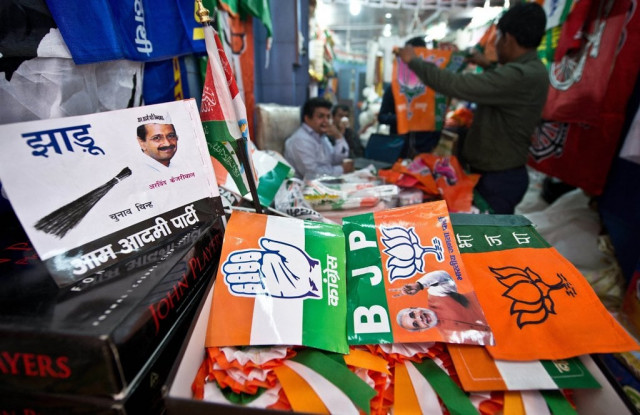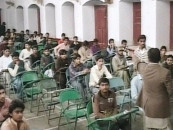India sets dates for world’s biggest election
Biggest election in history will see 814 million adults eligible to vote - 100 million more than 2009 elections.

Various Indian national and regional political party flags and election campaign materials are seen for sale at a wholesale shop in New Delhi on March 5, 2014. PHOTO: AFP
Voting for the 543-member Lok Sabha (lower house of parliament) will take place from April 7 until May 12 with results – in a first-past-the-post system – announced on May 16. The biggest election in history will see 814 million adults eligible to vote - 100 million more than last elections in 2009.
The EC chose the dates taking into account the availability of security forces to guard the nearly one million polling booths, as well as the onset of scorching summer.
This means the outgoing Congress-led coalition government, assaulted by the opposition for policy paralysis on account of the pressures put on it by its coalition partners, will be even more hamstrung in taking decisions for the next two and a half months.
The contest will pit Modi, son of a teastall owner, against Rahul Gandhi, the Harvard and Cambridge-educated scion of the dynasty which has dominated post-independence politics. After two terms of coalition government led by Gandhi’s leftist Congress party, the Bharatiya Janata Party (BJP) under Modi is widely forecast to emerge as the largest party in the new parliament.
Rahul Gandhi in private chats and one public interview has conceded that a decade in government has helped his party put in place several policies but has also created a sense of tiredness with the Congress-led coalition. The party has a government in 11 states, but has been rocked by charges of cronyism and corruption.
The BJP, on the other hand, is hungry to rule after 10 years in the opposition but does not have a cohesive leadership. Its PM candidate is mired in controversy following the 2002 communal riots in Gujarat. Although cleared of all wrongdoing in India’s apex court, Modi nevertheless has to live down the political tag of looking the other way while marauding mobs were killing Muslims in his state. However, Gujarat, from an already developed industrial and trading base, has become much more prosperous in the last 15 years that he has been chief minister.
Election prediction is a well developed science in India. Although not always accurate, there is remarkable unanimity among bookkeepers this time – they give an alliance led by Modi anything between 200 and 220 seats out of a total of 545, predicting that he will form a coalition government. There is a small chance that a disparate set of parties backed from the outside by the Congress banded together as the Third Front could also stake a claim to power. But with all the leaders of this Front having leadership ambitions, the chances are they will cross each other out.
A new movement spawned by widespread anger about corruption, the Aam Aadmi Party, will be an unpredictable element in this year’s polls and it hopes to win at least 100 seats. The balance in this election will be held by the two north Indian states which together contribute 120 seats out of 543: Uttar Pradesh (80) and Bihar (40). Unless the BJP can get at least 40 seats in UP and 20 in Bihar, Modi’s chances of forming the government will be considerably dimmed.
In India, it is officially game on. As the weather gets hotter, so will the political temperature.
Published in The Express Tribune, March 6th, 2014.



















COMMENTS
Comments are moderated and generally will be posted if they are on-topic and not abusive.
For more information, please see our Comments FAQ